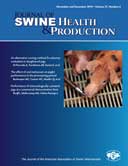Abstract:

Performance of immunologically castrated pigs at a commercial demonstration farm over 3.5 years
Larry Rueff, DVM; Martha A. Mellencamp, PhD; Lucina Galina Pantoja, DVM, PhD
Complete article is available online.
PDF version is available online.
A longitudinal study was conducted to evaluate performance and mortality of male pigs following immunological castration with a commercial gonadotropin releasing hormone analog-diphtheria toxoid conjugate (Improvest). Twelve groups of intact male weanling pigs (approximately 250/group) were delivered to a single barn over 3.5 years. Two doses of Improvest were administered subcutaneously, with the first dose given at 10 to 15 weeks of age and the second dose given at 18 to 19 weeks of age. Wean-to-market average daily gain (ADG) among the 12 test groups ranged from 0.83 to 0.99 kg/day (mean, 0.89 kg/day), feed efficiency (FE) ranged from 2.10 to 2.50 (mean, 2.24), and mortality ranged from 1.61% to 7.20% (mean, 3.25%). When lysine levels were increased by approximately 12% (groups 6-12), ADG increased by 6.3% and FE improved by 4.1%. Except for group 7 mortality, performance of all groups surpassed two 2016 industry benchmarks for ADG, FE, and mortality (National Pork Board Top 25% Producers and MetaFarms). Immunologically castrated barrows performed similarly with or without antimicrobial feed additives under these conditions. This study demonstrated that immunological castration delivered consistent high performance and livability that exceeded industry benchmarks.
Keywords: castration, immunological castration, feed efficiency, Improvest
![]() Cite as: Rueff L, Mellencamp MA, Galina Pantoja L. Performance of immunologically castrated pigs at a commercial demonstration farm over 3.5 years. J Swine Health Prod 2019;27(6):322-328.
Cite as: Rueff L, Mellencamp MA, Galina Pantoja L. Performance of immunologically castrated pigs at a commercial demonstration farm over 3.5 years. J Swine Health Prod 2019;27(6):322-328.
Search the AASV web site for pages with similar keywords.
